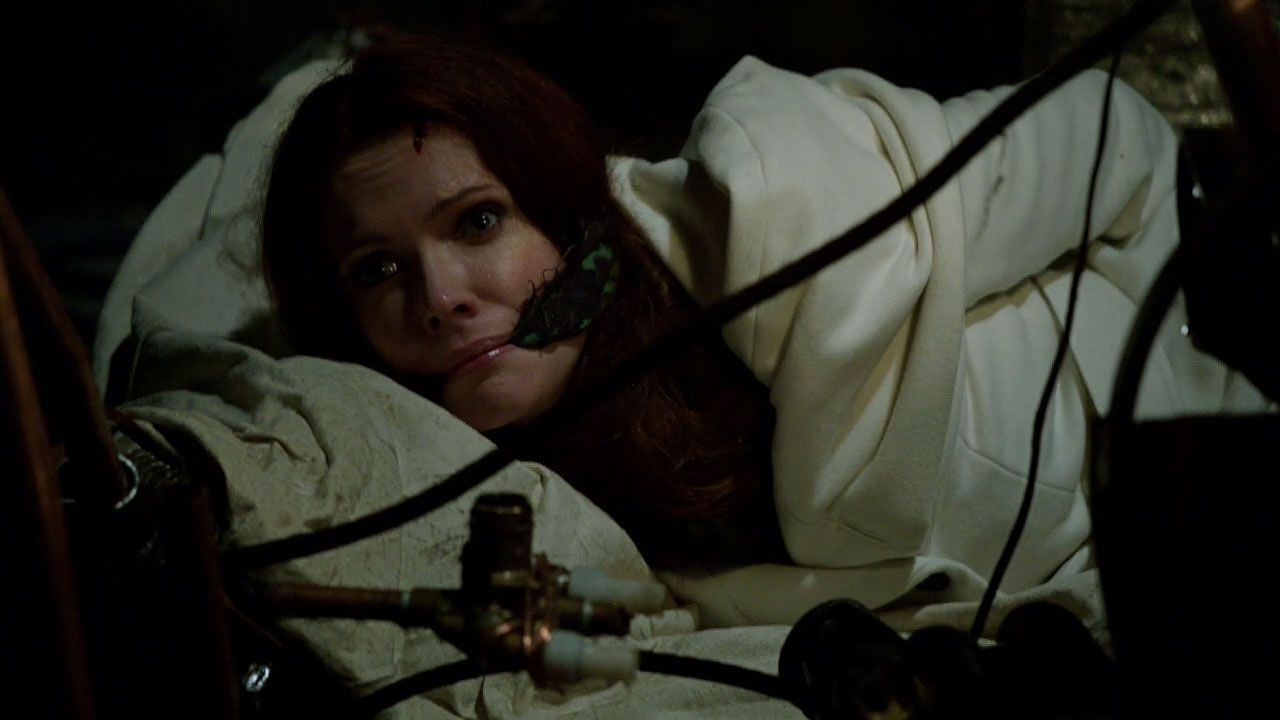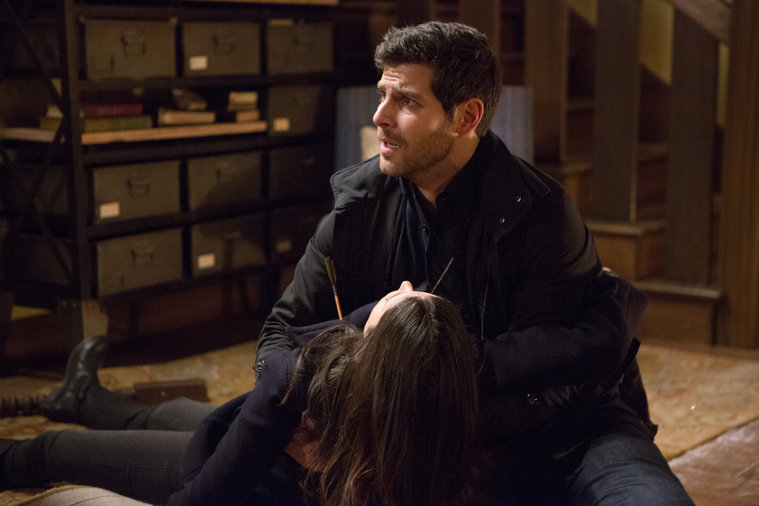Welcome to our Psychology of Inspirational Women series, in which Licensed Clinical Psychologist Dr. Janina Scarlet talks us through the mindset of our favorite female characters. Check out other entries in the Psychology of Inspirational Women series: Storm, Korra, Carol and Michonne, Buffy, Katniss, and Black Canary.
Please note spoilers for Grimm follow.
Juliette Silverton (played by Bitsie Tulloch) was initially the romantic partner to Nick Burkhardt, the leading character of the series and a Grimm. The Grimm’s job is to fight and destroy the Wesen, the humans who are also (to some extent) shape shifters, allowing them special abilities.
Personality
For most of the first two seasons of the show, Juliette had no idea that her boyfriend is a Grimm, nor did she know about the Wesen. A calm, composed, and extremely intelligent veterinarian, Juliette is always ready to help Nick and her friends. She even puts her life on the line at one point when one of her friends tries to get out of a violent marriage.
Traumatic history
Throughout the years, Juliette has risked her own life, or been put in danger because of her relationship with the Grimm numerous times. In the first season alone – in addition to being frequently stood up, kidnapped, and tied up – is sent into a coma, thanks to a nasty spell by Adalind Schade (a Hexenbiest, or a witch and Nick’s worst enemy).
 Adalind used Juliette’s position as a veterinarian in order to get to her. She brought in a cat with poison under his claws and used it as an opportunity to deliver the poison to Juliette, sending her into a coma.
Adalind used Juliette’s position as a veterinarian in order to get to her. She brought in a cat with poison under his claws and used it as an opportunity to deliver the poison to Juliette, sending her into a coma.

Nick’s friend, Rosalee, finds a way to revive Juliette and bring her back out of the coma – a potion that Nick’s boss, Sean Renard, needs to deliver to Juliette. Unfortunately the potion has a pretty significant side effect – it makes Juliette and Sean really hot for each other while making Juliette forget Nick.

In order to reinstate her memories of Nick and stop her obsession with Sean, Juliette agrees to begin a healing ritual, which ultimately causes her to have terrifying hallucinations and a lot of distress.

Once Juliette regains her memories, she goes through the shock of learning about the Wesen world and what Nick does as a Grimm. She continuously puts her life in danger to help Nick and his friends, especially when the Cracher-Mortel Wesen arrives to Portland, zombifying the city.

Once Juliette regains her memory, she is 100% in. She helps the Grimm team anyway she can. However, her patience (understandably) runs out when Adalind morphs herself to look like Juliette and has sex with Nick. Juliette is heartbroken and furious with both Nick and Adalind, even though Nick didn’t know that the woman he was sleeping with wasn’t Juliette. Given the amount of danger she and Nick (as well as their other friends) had been put in, Juliette wishes that Nick would just be “normal.” Her wish ends up coming true at Monroe and Rosalee’s wedding when Nick realizes in horror that he lost his Grimm powers.
Juliette has the opportunity to have a normal life again – to start over with her boyfriend, away from the Grimm-Wesen life. However, seeing how miserable he is not being a Grimm, coupled with Monroe being kidnapped and nearly murdered by the Wesenrein (the Nazi-like group of Wesen who oppose inter-Wesen marriage), she agrees to help Nick get his powers back. This is a major sacrifice as she gives up her one chance for the kind of peaceful life she always wanted. To make matters worse, in order for her to help Nick regain his powers, Juliette must turn into Adalind and sleep with him. This must have been excruciating – turning into the one person she hates the most, the one who almost killed her, the one who slept with her boyfriend, the one responsible for just about everything that ever went wrong in Juliette’s life. Yet, Juliette agrees to do it, at her own expense and doesn’t say much to others when she begins getting horrendous headaches after the transformation.
Juliette’s transformation
It wasn’t for a little while after the transformation that Juliette first realizes that she has become a Hexenbiest. Too terrified to say anything and trying to be there for her friends who are trying to rescue Monroe from the clutches of the Wesenrein, Juliette is all alone to deal with her transformation. When she can’t handle it anymore, Juliette finally reveals her dilemma to Sean, who tries to get her some help from another Hexenbiest, Henrietta. No matter how hard she tries, Juliette is unable to reverse her “condition” and is told that it will be permanent. Juliette is initially too scared to tell Nick as she fears that he will kill her given that Grimms and Hexenbiests are sworn enemies. When she does finally confide in Nick, he reacts with horror and leaves her to go find some answers. It must have been really frightening for Juliette to tell Nick the truth, and to have him storm out and leave her in the moment she needed him the most sends a clear message for Juliette – “You are a monster.”
Self-fulfilling prophecy
From that point forward Nick, his partner, Hank, and their friends, treat Juliette like a monster and like something that needs to be fixed, creating something called a self-fulfilling prophecy. A self-fulfilling prophecy refers to setting up an expectation and treating the individual according to this expectation, resulting in making that very expectation come true. When the gang treats Juliette like a villain and essentially fails to accept her transformation as permanent, Juliette, initially feeling both hopeless and frustrated, ends up becoming the very monster that the gang expected her to be. She causes a scene at a local bar, practically going “Carrie” on the guy that tried to hit on her, and gets arrested. She’s angry and most likely feels rejected and judged.
At the same time, for the first time in her life Juliette feels powerful and she’s enjoying it. Anger, coupled with vengeance, can actually feel good as it stimulates the “feel good” chemicals in the body, endorphins and dopamine. However, acting on these feelings can be destructive. Kenneth, a prince from Vienna, tasked with finding Adalind’s daughter, seems to know this, as he bails Juliette out of jail. He then tells her that Adalind is pregnant with Nick’s child, encouraging her to take revenge.
Furious, Juliette shows up at the precinct, finding Nick and Adalind talking in the hallway. Nick refuses to let Juliette hurt Adalind, which Juliette takes to mean that he has chosen Adalind over her. Kenneth uses Juliette’s fury to manipulate her to help him kill Nick’s mother and kidnap Adalind’s daughter. Juliette, full of hatred toward Nick, his friends (and most likely, herself), seduces Sean and later Kenneth as a way to get back at Nick.

Her sense of humanity seems to return as she visibly regrets having assisted in the killing of Nick’s mother. She returns to Nick’s house and apologizes and begs Nick to kill her. When he refuses, she charges toward him, only to be killed by Trubel, another Grimm.

Given the amount of physical and psychological trauma Juliette suffered with little to no support, it is not surprising that transforming into a Hexenbiest had such a strong effect on her. Being a levelheaded and calm individual her entire life, the wild side of being a newly-turned Wesen, and a Hexenbiest at that, was a lot to handle. In addition, the lack of support that Juliette received after her transformation, with everyone reacting in horror rather than with compassion essentially set her up to become the very monster everyone feared she would be.
What could have been done differently?
Just as any trauma survivor, be it a war Veteran, a burn survivor, or someone who lost their limb to a natural disaster, Juliette needed compassion and support when she turned. Many trauma survivors experience a lot of anger usually as a defense mechanism to help them better protect themselves. There are some helpful and unhelpful ways to support someone like Juliette who is undergoing a major traumatic change
What doesn’t help:
- When people minimize the experience
- When people promise that things will get fixed
- When people treat the survivor like a ticking time bomb or walk on eggshells around them
- When people use the phrase “at least,” as in “at least you survived.” This phrase, while possibly meant to be encouraging, usually sends a message that what the trauma survivor feels is wrong.
- The same goes for “look on the bright side,” there is no bright side in trauma.
- Saying how the person should feel, as in “you should be grateful for still having your family.”
- Saying that some other person or people are far worse than the individual also sends a message that what the person feels isn’t justified.
- Depending on the trauma, especially war trauma and sexual assault, the survivor may not want to be touched, this especially includes unsolicited hugs. It’s helpful to ask first before assuming that it’s ok to hug someone
- Avoiding the person
What ultimately helps trauma survivors:
- When people listen, really listen, with genuine concern
- When people admit that they don’t know what to say but wish to help
- When people offer to help out with things that might be difficult at the moment, such as groceries, chores, etc.
- When people ask if it’s ok to call or text to check in on the person
- Just being there. Less is truly more. We cannot “fix” the trauma but we can be there while the person is healing
- Most importantly – patience and compassion. People who underwent severe changes, like Juliette did, will take time to heal. They might seem better one day but feel worse the next. Everyone heals differently and some people take a very long time to heal. There is no time limit on healing.
It’s hard to say how things would have turned out if Nick and his friends treated Juliette with the kindness, compassion, and understanding that she so desperately needed. We might never know unless she is somehow brought back to life in season 5. I hope that we can remember her for the wonderful character/person that she was.
Dr. Janina Scarlet is a Licensed Clinical Psychologist, a scientist, and a full time geek. She uses Superhero Therapy to help patients with anxiety, depression, PTSD, and chronic pain to become the very best versions of themselves and become their own heroes. She can be reached via Twitter @shadowquill, Facebook: https://www.facebook.com/Shadow.Scarletl, or via her website at www.superhero-therapy.com.
—Please make note of The Mary Sue’s general comment policy.—
Do you follow The Mary Sue on Twitter, Facebook, Tumblr, Pinterest, & Google +?









Published: May 17, 2015 07:45 pm